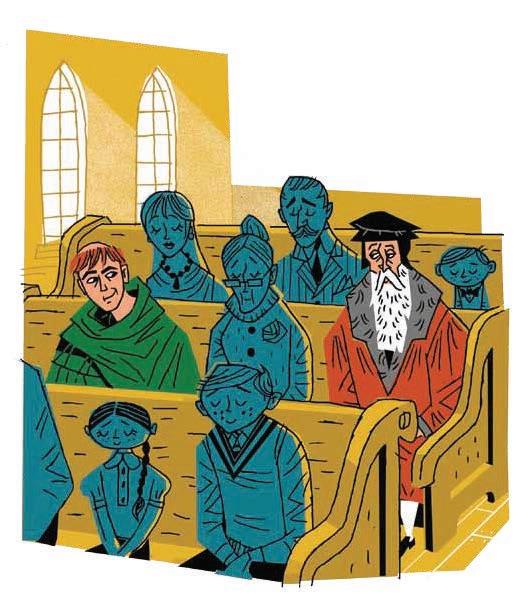
8 minute read
Is Evangelical Enough?
IS EVANGELICAL ENOUGH? by ADRIANE DORR illustration by STEVE WACKSMAN





LABEL THEM “RAMBO CATHOLICS.” CALL THEM “ECCLESIASTICAL BULLIES.” CLAIM THEY’RE “HARD-NOSED.” BUT IF YOU’RE BRAVE ENOUGH TO ASSERT Christian Orthodoxy (Loyola Press, 2002)—which analyzes this development in depth—points to THEY’RE GOING UNNOTICED, DO SO AT something bigger still: a substantial demographic suffering from shallow theology. Young, inquisYOUR OWN RISK. THEY KNOW BETTER. itive Christians find themselves increasingly opposed to a culture that turns men in on themselves rather than pointing them C onservative in all things theological (and social to Christ, asks eternal questions but can’t provide and political), this new league of outspoken Roman meaningful answers, and ultimately replaces the Catholics won’t be ignored. They’re well versed in comfort of the gospel with the theoretical gratificathe church’s apologetics and its place at the culturtion of relativity. al table, and they’re equally eager to dialogue with As repugnance for the superficial grows among pretty much anyone who’s interested. young people, pop Christianity continues to offer
They’ve piqued the interest of Protestants, and little in the way of help, still struggling to discovyoung people, in particular, have taken notice. er where it went wrong. And so the young faithful While they aren’t abandoning Protestant churches search for something filling, something profound, en masse, a slow, steady trickle of Christians have something to which their faith can lay hold and to dialogued, discussed and dived headlong into the which it can cling. But their struggle is bigger than Tiber, attracted to a theology that appears to have the contemporary culture. Their frustration lies in the history, orthodoxy, and reverence they’ve been their lack of a past. Protestant churches that have missing. forfeited the church’s ancient creeds and confes
These converts have commonalities. They are sions, liturgies and hymnody have become their mainly evangelical, and they are mostly millenown downfalls, producing a generation that longs nials, the 80 million or so young men and women for—but has not been given—a theological foundaborn from the mid-1970s to the early 2000s. But tion, a churchly history. it’s not just the young. Seasoned Protestant pasThe youth’s response? To reject their “Boomer tors and theologians—Richard John Neuhaus and parents’ fascination with novelty and reinvention,” Francis Beckwith among them—felt the pull to Rosays Issues, Etc. radio host Rev. Todd Wilken. He’s man Catholicism as well. Their migration leaves on to something. Scot McKnight, professor of New the churches of the Reformation with two choices: Testament at Northern Seminary in Lombard, Illito pretend it’s not happening or to confess the faith nois, a±rms that young Protestants are discovereven more robustly. ing that “evangelicalism is not enough, because it does not absorb the one, holy, catholic and apostolSPITTING UP SPIRITUAL MILK ic Church into its very bones.” 1 They’re looking for something else, he believes—something enduring, reverent, disciplined, historic. The publication of Colleen Carol Campbell’s The So if the recent evangelical push toward coeeNew Faithful: Why Young Adults are Embracing houses and contemporary worship, praise bands,
and introspection isn’t meeting the theological needs of America’s youth, what is? “Ancient worship with a contemporary flair,” wrote Robert E. Webber, author of the widely read Ancient-Future Faith: Rethinking Evangelicalism for a Postmodern World (Baker Academic, 1999). They want a church that has an “authentic character,” “more use of ritual and symbol,” “more frequent celebration of communion,” “high participation,” and a “recovery of the Christian year as a spiritual discipline.” 2
Catholicism—well known, vocal, and historical—then becomes the natural choice, Wilken says. “For many evangelical millennials, Roman Catholicism is the opposite of everything they have come to know as ‘church.’ It is low-tech, high-church without a hint of marketing or sales pitch.” They’re tired of the theological milk, he explained over a decade ago. They’re hungry for meat.
WHAT IS TRUTH?
The Roman Catholic creators of websites like calledtocommunion.com (“where Rome meets Reformation”) or Catholic Answers (forums.catholic. com) recognize this generation’s theological discontent. Intertwining robust apologetics and technology, the church now utilizes a unique platform to welcome disgruntled evangelicals “home” to Rome.
Their theological presence on the Internet is formidable. From Facebook groups to blogs, Roman Catholics have been purposeful and persistent in making the case for their church. And they aren’t doing it quietly. Notre Dame’s Cathleen Kaveny labeled them “Rambo Catholics” during the 2004 Bush/Kerry presidential race, offended at their forceful theological stances in the public square. But rather than shying away from the phrase, Roman Catholics are embracing it.
Thomas Peters, who runs the “American Papist” blog at catholicvoteaction.org, wears the title willingly. To be a Rambo Catholic signifies that he’s “proudly, joyfully orthodox.” That orthodoxy and its accompanying longevity, Peters believes, appeals to a generation channeling Pilate’s question: “What is truth?”
People find that truth in the Catholic Church because it “challenges them, and not merely accommodates them,” he says. “The Catholic Church has held fast to the moral traditions taught by 24
Christ and…[converts] see a great deal of continuity between the early Church and how the Catholic Church believes and practices today.”
Mason Beecroft is proof. Raised as a nondenominational evangelical, Beecroft joined the Lutheran Church—Missouri Synod (LCMS)—a creedal, liturgical, and sacramental church body of more than two million members—as an adult, awed by the confession and absolution found in the liturgy. To “hear that my sins were forgiven for the sake of Christ was an incredible comfort,” he recalls.
He attended an LCMS seminary and pastored his own parishes, but the lack of doctrinal consistency within the church-at-large was hard to overlook. Like a handful of former LCMS pastors (most of whom converted to Eastern Orthodoxy), he’s since left the ministry and has settled into Roman Catholicism, “drawn by the Mass, mystery, and tradition.” “Rome is consistent on its theological and moral teachings,” he says simply. “Even with all of the scandal, the Church is solid.”
THE R E FO RMATION CONTINUES
But not all roads lead to Rome. Many people, such as Benjamin Bosch, have discovered the theology of the Reformation after wrestling with di±cult theological questions. Bosch began to delve more deeply into the confessional writings of the LCMS after one of his friends, a pastor, converted to Catholicism. He was later confirmed into the Lutheran church as an adult. His reasons? The church
was devoted to Scripture, used the historic liturgy, engaged the Lectionary, and confessed the bodily presence in the Lord’s Supper—the same things evangelicals are longing to find.
So why Lutheranism and not Catholicism? Why Bosch but not others? Terence Maher, who was raised in the Roman Catholic Church but ended up taking a circuitous path to confessional Lutheranism by way of Orthodox Judaism, thinks it’s rather simple. He found in Lutheranism “no new doctrine or no new church, but the same one, the only one, that has been there all along.” Converting to Lutheranism “was to accept and preserve the constant liturgy of the Church, right along with the faith it expresses,” he says, but, unlike Roman Catholicism, “pruned of excesses and accretions.”
A SINGULAR TRUTH
While young Christians may be attracted to Rome’s presumed longevity and so-called authenticity, there’s one fact Catholics can’t ignore: “Catholicism has suered the greatest net loss in the process of religious change….One-in-ten American adults is a former Catholic.” 3 It’s a more telling trend: Rome can attract new members, but she has a hard time keeping them.
Reformation theologians asking Luther’s standard question—“What does this mean?”—can conclude that Rome doesn’t have a hold on proclaiming the gospel to a wandering generation after all. Instead, the historic, faithful churches of the Reformation actually have a profound opportunity to speak biblical truth to this confused culture, to point out what sets Wittenberg apart from Rome. One group in particular stands ready to face the challenge: a theologically astute clergy. And one of the most critical aspects of their ability to carry the church’s enduring, faithful response to the world, explains Dr. Lawrence Rast, president of Concordia Theological Seminary in Fort Wayne, Indiana, is their formation. “Theological education,” he says, “forms students who have the ability to articulate, carefully and clearly, the biblical witness as rightly confessed in the Lutheran Confessions and maintained in the historic church.” These pastors, alongside their catechized laity, have an “ecumenical task,” explains LCMS president Matthew C. Harrison, “to hold forth worldwide for orthodox, biblical Christianity—for the singular authority of Holy Scripture; for the singular truth that salvation is completely by grace on account of Christ’s meritorious life, death and resurrection for us; for the singular truth that this gift is grabbed hold of solely by faith, which is itself worked completely by God through His Word.”
It is that task that holds up the exact things millennials long for: Scripture, creeds, worship. It is that confession that is kept safe in the churches born from Luther’s Reformation. It is that truth that confronts the culture. It is that gift that sets faithful theology apart. It is that mercy, given by Christ, that sees it through to fulfillment. And so the theologians of the Reformation must remain tenacious and bold in their confession, despite a generation’s flirtations with Rome and without fear of confronting the culture. “Be watchful, stand firm in the faith,” St. Paul encourages. “Act like men. Be strong. Let all that you do be done in love” (1 Cor. 16:13–14). And, by God’s grace, they do.
Adriane Dorr is managing editor of The Lutheran Witness.
1
2
3 Scot McKnight, “From Wheaton to Rome: Why Evangelicals Become Roman Catholic,” Journal of the Evangelical Theological Society, vol. 45, no. 3 (September 2002). Robert Webber, “How Will the Millennials Worship? A Snapshot of the Very Near Future,” Reformed Worship (March 2001). “Faith in Flux: Changes in Religious A±liation in the U.S.,” Pew Forum on Religion and Public Life (April 2009; rev. February 2011).





